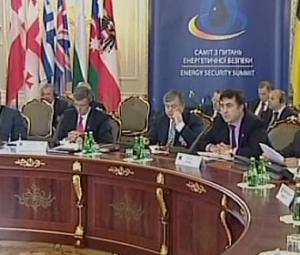
TRANSIT SPACE CONCEPT LAUNCHED AT KYIV ENERGY SUMMIT
Publication: Eurasia Daily Monitor Volume: 5 Issue: 102
By:

The presidents of Azerbaijan, Georgia, Ukraine, Poland, and the three Baltic states, along with officials from other European and Caspian region governments, the European Union and the United States, met on May 22 and 23 in Kyiv for a summit on energy security. It was the third in a series of summits of this group, seeking ways to reduce Russian leverage on the energy security of countries along the producer-transit-consumer chain.
The Kyiv summit approved a ”Concept of the Caspian-Black Sea-Baltic Energy Transit Space,” which focuses on connecting Caspian producer countries, via the South Caucasus and Ukraine, directly with EU territory. Without naming Russia, the concept aims to dent Russia’s transit monopoly by creating new transportation routes, in the shared interest of European consumer and Caspian producer countries alike. This Transit Space is seen as an “indispensable component of a European energy policy.”
The Concept proceeds from the rapidly growing interest shown by countries and companies in the EU and the Caspian basin in opening direct access to each other. It calls for implementing the Imitative for International Interaction at the State and Corporate Levels, launched by the summit participants and Kazakhstan at the preceding energy summit (Krakow 2007). It defines the Concept itself as a contribution to the EU’s attempts to create a unified energy policy and a single energy market. And it envisages further development of the Concept consistent with EU laws and “in the spirit of the Energy Charter Treaty” (a document that Russia has signed but would not ratify while refusing to sign the treaty’s Transit Protocol).
The Transit Space Concept envisages an “open alliance of interested countries,” which can also be joined by countries beyond the Caspian-Black Sea-Baltic regions.
At the summit, the presidents decided, with the endorsement of other participating governments, to create an Inter-State Working Group that would consider specific proposals for practical implementation of the Concept, work out recommendations in concert with the EU, and present them for approval at the next energy summit of the initiating countries, which is scheduled for November in Azerbaijan.
A separate declaration on energy security, signed by all the participating countries, calls for common energy security policies that would “minimiz[e] political and transit risks,” “preclude potentially disruptive actions affecting energy supplies,” and adhere to the “principles of “transparency, uninterruptibility, and non-discrimination” in the supply contracts. These concerns stem from the multiple interruptions in Russian oil and gas supplies from 2003 to 2007 to countries ranging from Georgia, Ukraine, and Belarus to “new” and “old” EU member countries Latvia, Lithuania, Poland, and Germany. These interruptions also indirectly affected other EU member countries as well, and could potentially be repeated in the future.
Reflecting those concerns, Estonian President Toomas Ilves told the summit, “Only when the EU speaks with a common voice on energy policy and acts as a common energy market will it be possible to resist any country’s attempts to turn energy supplies into political leverage.” Noting that Russia’s projects Nord Stream and South Stream (in the Baltic and Black Sea, respectively) contravene the EU goals of energy security and supply diversification, Ilves urged the EU to focus on the Caspian basin.
Georgian President Mikheil Saakashvili noted that Russia was attempting to shut down the Caspian-Europe transit corridor by putting pressure on Georgia but predicted that the attempts would fail.
In an accompanying decision, the presidents launched the project of a Euro-Asian Oil Transportation Corridor, with the Odessa-Brody pipeline as the kernel of an evolving, far larger system (see EDM, May 27). Ukraine is set to take a political decision on switching from “reverse-use” (north-south) of the pipeline by Russian oil producing companies to “forward use” (south-north) by Azerbaijan and Ukraine, pumping Azerbaijan’s (and later also Kazakhstan’s) oil to EU territory. Ukraine’s political decision is expected within two to three months and is a matter of consensus between the presidency and government.
Pending the Odessa-Brody pipeline’s extension into Poland, the only option for Azerbaijani oil to reach EU territory is via the Ukrainian stretch of the old Druzhba pipeline system. The Odessa-Brody pipeline connects at Brody with Druzhba, which continues into Slovakia and onward to the Czech Republic, carrying Russian oil of the relatively low-quality Urals blend. Azerbaijan’s oil is of high quality, however, and must be transported separately from Russian oil in the same pipeline. Such separation is, in principle, feasible through the process known as batching. Shortly before the Kyiv summit, the oil transport company UkrTransNafta (operator of Ukraine’s section of the Druzhba pipeline) experimented with batching Azerbaijani oil through the Druzhba line without loss of quality. The summit participants issued a statement welcoming the success of this experiment and the ensuing agreements of intent on the transit of Azerbaijani oil via Slovakia to the Czech Republic.
Kazakhstan and Turkmenistan are reacting cautiously to the proposed Transit Space Concept. They are awaiting specific proposals from Europe on supply agreements and direct transportation options (”Concept of the Caspian-Black Sea-Baltic Energy Transit Space” and accompanying documents of the Kyiv summit, May 22-24; UNIAN, BNS, May 22-24).




